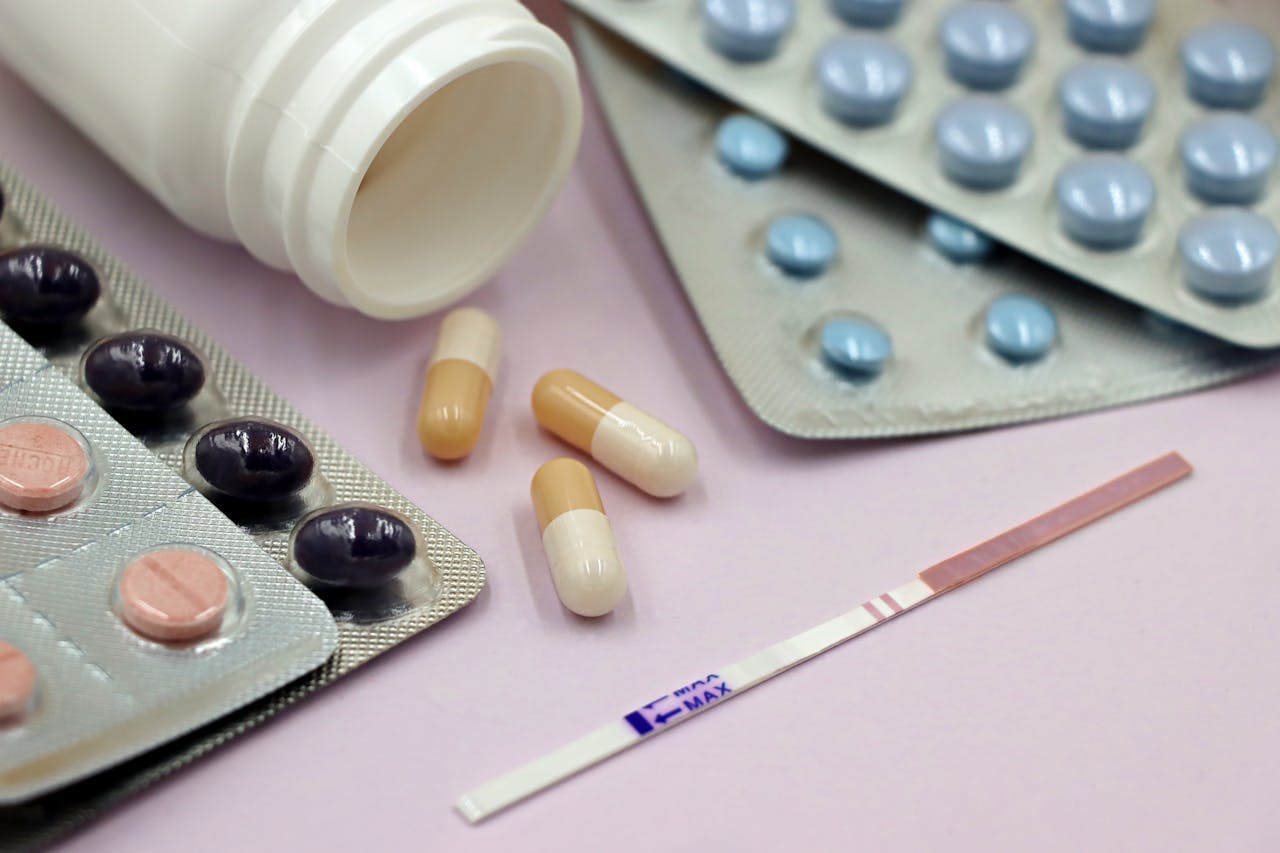
Table of Contents
Hormones are chemical messengers in the body that help regulate different body processes. There are many various hormones, and each has a specific job.
Key Takeaways
- Definition: Hormones are chemical messengers produced by endocrine glands like the adrenal gland and travel through the bloodstream to various body parts.
- Types: Include steroid hormones (e.g., sex hormones), peptide hormones (e.g., insulin), and amino acid derivatives.
- Functions: Hormones control processes like growth, metabolism, mood, and reproduction, involving glands like the parathyroid and other endocrine glands.
- Imbalances: Can cause conditions like overactive thyroid and diabetes, diagnosed via blood tests and physical exams.
- Health: Maintaining an endocrine system healthy involves a balanced diet, exercise, and stress management.
What are hormones?
The brain, the pituitary gland, the thyroid gland, or the adrenal glands can produce hormones. They travel through the bloodstream to different body parts, interacting with cells, tissues, and organs.
Hormones affect many body functions, such as growth, metabolism, mood, and reproduction.
According to their chemical makeup, hormones can be divided into three categories: steroid hormones, peptide hormones, and amino acid derivatives.
Steroid hormones
Steroid hormones, made from cholesterol, include the sex hormones such as estrogen, progesterone, and testosterone and the adrenal cortex hormones, including cortisol, aldosterone, and androgens.
Steroid hormones are transported through the body in the bloodstream by transport proteins.
Peptide hormones
Peptide or protein hormones include the pituitary hormones, growth hormone, prolactin, LH, and FSH, thyroid hormones (T3 and T4), insulin, glucagon, and PTH.
Peptide hormones rapidly break down, allowing organisms to use them effectively to direct processes without a prolonged signal.
The endocrine system and endocrine glands
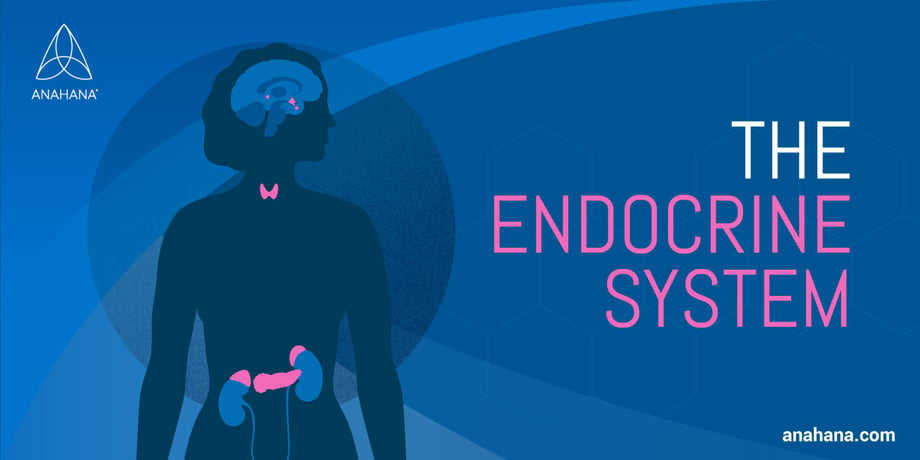
The endocrine system comprises multiple organs called glands that produce hormones. Hormones then act as chemical messengers to coordinate many body functions. The major endocrine glands are the pituitary gland, thyroid gland, and adrenal glands, which are all part of the endocrine system.
The hormones produced by these glands help regulate essential body functions, including growth, metabolism, and stress response.
Pituitary gland
The pituitary gland's location is at the base of the brain. It's often called the "master gland" because it produces hormones that regulate other glands' hormone production.
The pituitary gland is controlled mainly by the hypothalamus, which senses the levels of hormones in the body and signals the pituitary gland to release hormones that increase or decrease the production of hormones of the target glands.
There are two parts to the pituitary gland: the anterior lobe and the posterior lobe. The anterior pituitary produces six hormones: growth hormone, thyroid-stimulating hormone, adrenocorticotropic hormone, follicle-stimulating hormone, luteinizing hormone, and prolactin. The posterior lobe of the pituitary only produces two hormones: vasopressin and oxytocin.
-
Growth Hormone
- Growth hormone (hCG), also known as somatotropin, is responsible for bone and muscle growth and cell reproduction. It's involved in regulating bone and muscle growth and energy metabolism.
- Growth hormone plays a significant role in increasing height during puberty and maintaining bone strength throughout adulthood.
-
Thyroid-stimulating hormone
- Thyroid-stimulating hormone (TSH) regulates the thyroid gland. The thyroid gland produces hormones that regulate metabolism, heart rate, and body temperature. Thyroid stimulating hormone will try to ensure the correct levels of thyroid hormone in your body.
- Thyroid hormone levels that are too high can cause hyperthyroidism, whereas too little thyroid hormone cans cause hypothyroidism.
-
Adrenocorticotropic hormone
- Adrenocorticotropic hormone (ACTH) regulates the adrenal glands. The adrenal glands produce hormones involved in stress response, metabolism, and blood pressure regulation. ACTH governs the production of the adrenal hormone cortisol, the stress hormone.
- Abnormal cortisol levels can adversely affect the body and indicate other conditions such as Cushing's syndrome.
-
Follicle-stimulating hormone
- Follicle-stimulating hormone (FSH) is an essential hormone for the reproductive organs. FSH regulates the ovaries in women and the testes in men.
- Specifically, FSH is involved in developing eggs in women and sperm in men.
-
Luteinizing hormone
- Luteinizing hormone (LH) is another hormone involved in the reproductive system which regulates the female ovaries and the testes in men.
- LH is involved in ovulation (the release of an egg from the ovary) in women and testosterone production in men.
-
Prolactin
- Prolactin is involved in milk production and the development of the mammary glands.
-
Vasopressin (antidiuretic hormone)
- Vasopressin, also known as antidiuretic hormone (ADH), regulates water balance in the body by regulating water excretion from the kidneys.
- For example, vasopressin helps the body conserve water by reducing urine output.
-
Oxytocin
- Oxytocin is involved in reproduction, lactation, and bonding. It's sometimes called the "cuddle hormone" because oxytocin releases during hugging and other forms of physical contact.
Thyroid gland
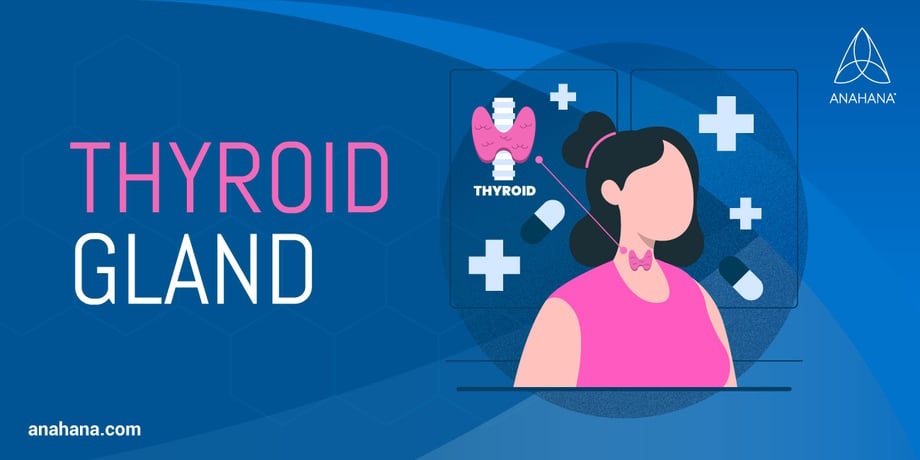
The thyroid gland is in the neck. It produces two hormones: thyroxine (T4) and triiodothyronine (T3). These hormones help regulate metabolism, heart rate, and body temperature.
Adrenal glands
The adrenal glands are on top of the kidneys and produce hormones in the body's stress response, metabolism, and blood pressure regulation. The adrenal glands have two parts: the adrenal cortex and the adrenal medulla.
The adrenal cortex produces three main hormones: glucocorticoids, mineralocorticoids, and androgens. The adrenal medulla produces two hormones: epinephrine and norepinephrine. All of these hormones are involved in the body's fight-or-flight response.
-
Glucocorticoids
- Glucocorticoids are involved in stress response, immune system regulation, and metabolism. The most important glucocorticoid is cortisol, the body's primary stress hormone.
-
Mineralocorticoids
- Mineralocorticoids are involved in electrolyte balance and blood pressure regulation. The most critical mineralocorticoid is aldosterone, which controls sodium and potassium levels in the body.
-
Androgens
- Androgens are male sex hormones. The most important androgen is testosterone which regulates the development of the male reproductive system and plays a role in muscle and bone mass.
- Androgens can also be present in small amounts in women.
-
Epinephrine
- Epinephrine, also known as adrenaline, prepares the body for the flight or fright response during acute stress. It increases heart rate, blood pressure, cardiac output, and raising glucose levels.
-
Norepinephrine
- Norepinephrine is considered a neurotransmitter and a hormone. Norepinephrine is also released in response to acute stress and affects many organs and tissues of the body.
- This includes dilating the pupils, opening airways, and increasing heart rate.
Ovaries
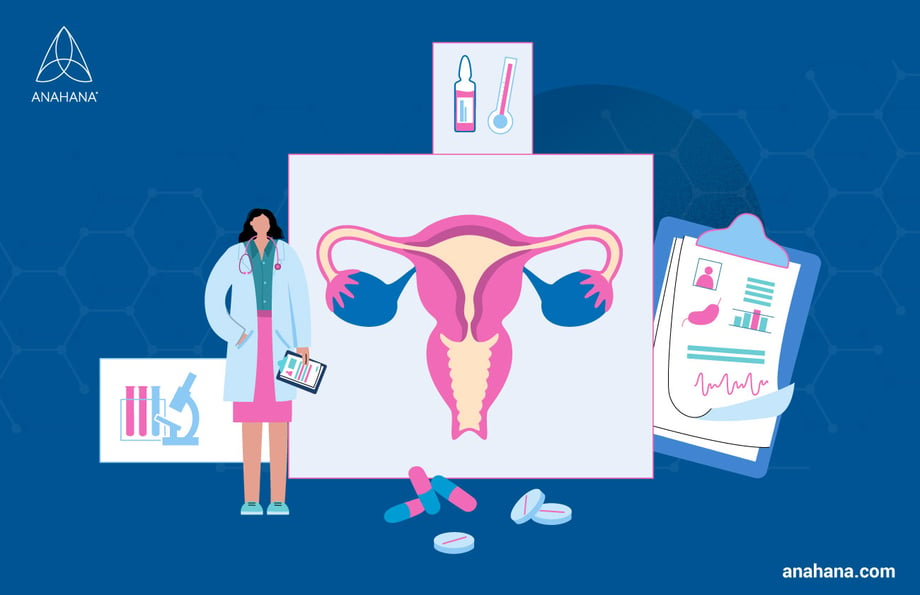
The ovaries are in the pelvic area. They produce two main hormones: estrogen and progesterone. Estrogen is involved in the development of female sexual characteristics and the regulation of the menstrual cycle. Progesterone is involved in preparing the uterus for pregnancy.
Testes
The testes are in the scrotum and produce two primary hormones: testosterone and inhibin. Testosterone is involved in the development of male sexual characteristics, such as muscle development and hair development, as well as sperm production. Inhibin is involved in regulating sperm production.
Pancreas
The pancreas is in the abdomen and produces hormones that help to regulate blood sugar levels, including insulin, glucagon, and somatostatin. These hormones help regulate blood sugar levels.
The pancreas releases insulin to decrease blood sugar levels and releases glucagon, raising blood sugar levels. Somatostatin inhibits the release of glucagon and insulin.
Parathyroid gland
The parathyroid gland is behind the thyroid gland. It produces a hormone called parathyroid hormone (PTH), which regulates calcium levels in the blood, which is essential for maintaining bone health.
Pineal gland
The pineal gland is located in the brain and produces the hormone melatonin. Melatonin helps regulate the sleep-wake cycle and the body's natural circadian rhythm.
Hormone imbalances
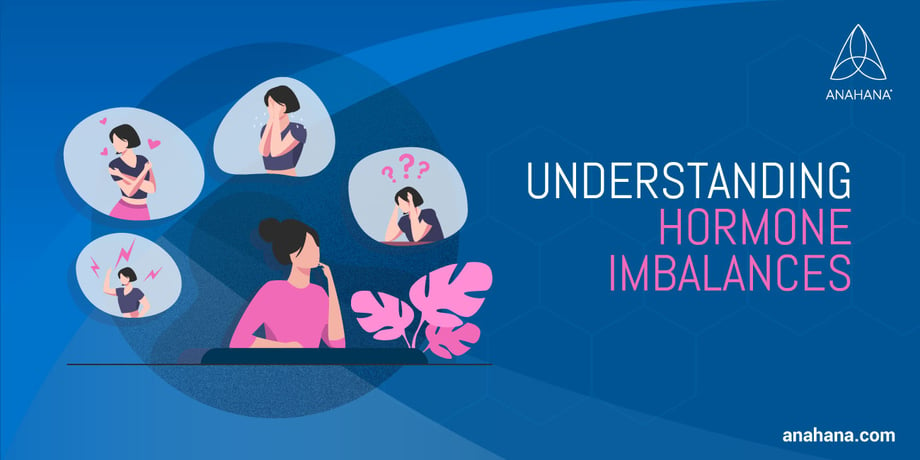 Hormone imbalances occur when there is too little or too much of one or many hormones. Certain hormones being too high or too low can have noticeable effects on the body. Hormone imbalances can cause diabetes, infertility, thyroid diseases, and obesity.
Hormone imbalances occur when there is too little or too much of one or many hormones. Certain hormones being too high or too low can have noticeable effects on the body. Hormone imbalances can cause diabetes, infertility, thyroid diseases, and obesity.
Some natural processes in the body may change hormone levels, including puberty, menopause, and pregnancy.
Other factors that could cause an abnormal change in hormone levels include high-stress levels, environmental effects, and lifestyle, including diet and exercise or medications.
Some natural ways to maintain proper hormone levels include eating a balanced diet with adequate protein, exercising regularly, finding ways to reduce stress, such as meditation or yoga, and maintaining a healthy body weight.
Frequently asked questions: what are hormones
What is the most crucial hormone in the body?
There is no single "most important" hormone in the body. Different hormones are essential for various functions. For example, thyroid hormones help to regulate metabolism, while adrenal hormones help to regulate stress response.
What are the symptoms of hormone imbalance?
Symptoms of hormone imbalance can vary depending on which hormones are out of balance. For example, an imbalance of thyroid hormones can cause fatigue, weight gain, or depression. An imbalance of sex hormones can cause irregular periods, hot flashes, or low libido.
If you are experiencing any unusual symptoms, you must speak to a healthcare provider to determine if a possible hormone imbalance is a cause of these symptoms. Laboratory tests can help to detect hormone imbalances.
What is the difference between a hormone and a neurotransmitter?
Hormones are chemicals that help the body control its growth and function. Hormones are chemicals produced by glands. They travel through the blood to different parts of the body. A neurotransmitter is a chemical that helps send messages between nerve cells in the nervous system.
References
Hormones: What They Are, Function & Types
18.1 Types of Hormones – Concepts of Biology – 1st Canadian Edition
Endocrine System: What Is It, Functions & Organs
Overview of the Pituitary Gland - Hormonal and Metabolic Disorders - Merck Manuals Consumer Version
Reactome | Glycoprotein hormones
The Pancreas | Johns Hopkins Medicine
Epinephrine | Description, Production, & Function | Britannica
Norepinephrine: What It Is, Function, Deficiency & Side Effects.
HGH (Human Growth Hormone): What It Is, Benefits & Side Effects
Adrenocorticotropic Hormone (ACTH): MedlinePlus Medical Test
Cortisol: What It Does & How To Regulate Cortisol Levels
Aldosterone | You and Your Hormones from the Society for Endocrinology
10 Natural Ways to Balance Your Hormones
Hormonal Imbalance: Causes, Symptoms & Treatment
Disclaimer
The contents of this article are provided for informational purposes only and are not intended to substitute for professional medical advice, diagnosis, or treatment. It is always recommended to consult with a qualified healthcare provider before making any health-related changes or if you have any questions or concerns about your health. Anahana is not liable for any errors, omissions, or consequences that may occur from using the information provided.

By: Anahana
The Anahana team of researchers, writers, topic experts, and computer scientists come together worldwide to create educational and practical wellbeing articles, courses, and technology. Experienced professionals in mental and physical health, meditation, yoga, pilates, and many other fields collaborate to make complex topics easy to understand. Anahana is also home to specialists in crystals, tarot, angel numbers, astrology, life path numbers, zodiac signs, and horoscopes. By combining evidence-based wellness with spiritual and energetic practices, the team offers clear, trustworthy guidance for both mind-body health and modern spirituality.